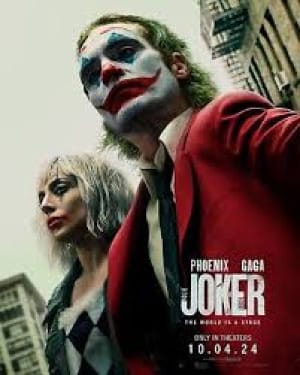Broken Promises and Sad Jokers
You know why you opened the book or came to the cinema. The big question: did its creators know that was what you wanted? And what if they thought you wanted something else?

People talk of promises - the promises a writer makes to the reader at the beginning of the book. Through style, genre or through the content of the opening chapters. LA Confidential, for example, promised no-holds-barred, teeth-bared, racist 1950s cop action in LA’s seedy underbelly and it delivered.
Another example: Terry Pratchett’s Maskerade made a promise about theme. Pratchett’s plots were always prone to going off on tangents, but the usually held firm to a central conceit. Maskerade goes out of its way, over and over, to make the point that what is outside is just for show. We all wear masks, the text says, but what matters is the inner self.
Take the heroine, Agnes Nitt. Overweight and unappealing to the eye, but blessed with magical and musical talent and a good heart. There’s the trainee soprano, beautiful but empty-headed and devoid of ability. There’s the famous Quirmian tenor, secretly from Ankh-Morpork, hiding behind his more exotic alter ego. And there is Walter, a parody of the lead from Some Mothers Do Ave ‘Em, riffing on the star’s later switch to musicals. Walter, under his hapless bumbling exterior, holds a dark secret.
Masquerade is great fun for 95% of its length. It flows beautifully from set up to crisis to climax and then Pratchett, in my opinion and extremely unusually for him, totally buggers up the denouement. He spends hundreds of pages building a story where what is inside trumps what is outside and, right where hero and heroine should be celebrating their victory, has the one character who should understand more than anyone else the thematic point - inner qualities trumping outer appearance - turn around and directly deny it. Walter’s alter ego, now in control of him, chooses outer beauty over inner talent and denies Agnes the opportunity her talent is due, because she isn’t beautiful. In one sentence, in one decision, I believe Pratchett denied his theme and spoiled his ending. No satisfaction for me. The pleasure of a just resolution drained away and I’m still mad about it 25 years later.
I don’t understand why Pratchett ended it that way, at least not for narrative reasons. Pratchett loved the concept of narrativium - the idea that stories have a universal logic and shape themselves in specific ways – but ignored it for this one resolution. There are meta-narrative reasons why Agnes should fail in her quest to be an opera singer. But again, these aren’t satisfying. Pratchett never denies the conventions of the genre. He promised his readers a jolly fun Discworld adventure and we got that. I only wish he hadn’t spat on the resolution.
But this Breadcrumbs is a piece about broken promises. Imagine a movie which is set in the famous DC comic book locale. It has characters named after those from that setting. It is named after the most famous villain in that comic book. You write a bleak nihilistic movie about how a mentally ill man, desperate to be loved and recognised, fell apart as he tried to be a comedian and ended up the unwilling figurehead of an anarchist, anti-capitalist, anti-society movement. You release it. People lose their minds over it because it captured the zeitgeist. It captured the irritation that people felt about being overlooked, about being grist for the capitalist mill. It took a billion dollars at the box office. You make Joker, a film in which the director and star promised to show you how Arthur Fleck becomes Joker. Not The Joker, an insane evil genius. Far too many people decided the Arthur was the Joker even though nothing in the film nor Arthur’s character supported the idea.
Then some bright spark at Warner Brothers or DC looked at the bottom line and wanted more. Millions of people love Joker! Critics too. Awards! Awards everywhere! Let’s do it again.
Hundreds of millions spent in production later and Joker: Folie a Deux was ready for release. This time it promised to feature the Joker’s sometime muse Harley Quinn. It would have song and dance numbers and…crickets. Into the gap where rumour and hype should be, where the studio promises what the audience they can expect, silence. Fans of the first film filled the silence with the promises they wanted. They wanted Fleck to become the Joker and escape from Arkham with Harley Quinn and rampage through Gotham. To hell with society! Anarchy! We are the Sigmas!
What they got was 140 minutes of Fleck failing to reject his humanity and ascend into the cottony clouds of delusion. They didn’t get a comic book movie. They got the fragmentation and dissolution of a mentally ill man. They wanted fireworks and chaos and the Joker riding off into the sunset while young Bruce Wayne broods and plots his revenge. They wanted baroque villainy on the grand scale and the studio gave them sad Joaquin Phoenix honking out showtunes.
Superhero media, including this film, contains an in-built set of promises. Stories featuring the Joker add a suite of their own. Todd Phillips and Scott Silver ignored all of that in their screenplay and delivered a movie which not only had nothing to say about the Joker mythos, but also nothing to say about mental health, or at least nothing interesting or worthwhile. At some point in the future, film theorists may discover exactly which audience Joker: Folie a Deux was intended for. On a number of levels, performance, cinematography, this is a fine movie. It is beautifully shot, and Phoenix is tragic and understated and Lady Gaga as committed as ever. Yet as an exercise in superhero storytelling, in the Joker mythos, it fails. What people wanted from it was simply not what was delivered.
I’m not sure how Todd Phillips and Scott Silver and the host of producers at Warner and DC failed to understand this point. They knew how people responded to the first film. They saw how well it did. They saw how people acted when the sequel was announced. They saw the hype that was built up around it, and they went ahead and delivered a strange, pointless, hollow and unmusical musical tragedy. I don’t think anyone will be able to explain why they made it this way. The audience was dying for the Joker’s origin story and the studio delivered dollar-store One Flew Over the Cuckoo’s Nest, with songs.
That is my breadcrumb. Know your genre. Know its conventions. Be prepared to deliver something the audience will recognise even if you later subvert all of those conventions and go tumbling off wild and carefree into unexpected territory. But when you break the genre's promises to the audience and write an unsatisfying story and go against the themes and styles that people are expecting, then nobody will want to engage with it.



